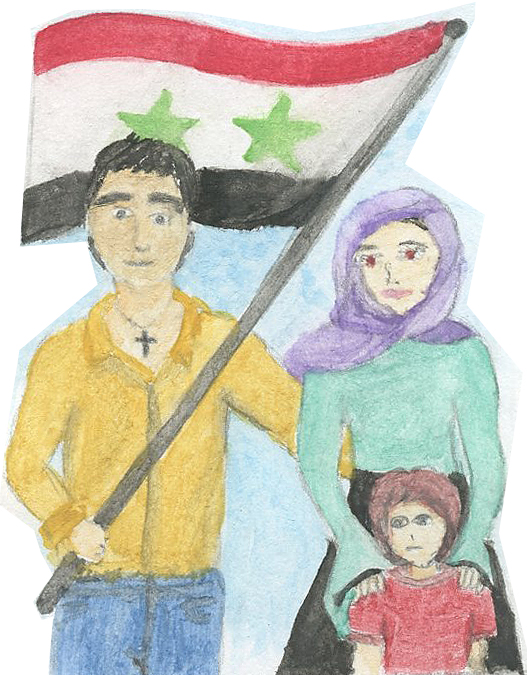South reflects on recent unfolding conflicts in Syria
Illustration.
February 10, 2017
The Syrian city of Aleppo fell when the forces of President Bashar Al-Assad overtook the rebel strongholds in the eastern part of the city in December. Members of the student body and staff have been affected by the city’s fall.
The Aleppo civil war dates back to 2012 when rebel forces first captured the city during the “Arab Springs”- a period of protests across the Middle East.
The pro-government troops consist of Hezbollah—a group led by Shi’a Muslims, Christian militias, Russian and Iranian forces. The rebels are led by the Free Syrian Army and are supported by the al-Tawhid Brigade—a group of Sunni Muslims, the United States and Turkey.
Although the battleground is 6,000 miles away, the repercussions are felt by some members of the GBS faculty and the student body, such as custodians Sahar Barkho and her husband Stewart Adam. They are both Syrian natives and have a personal connection to Aleppo.
“My parents [lived] in Aleppo but escaped to Lebanon as refugees.” Adam said. “They were scared because [of the violence]. I talked to them and they said ‘Thank God, [Aleppo] is back in the government’s hands.’”
Adam shares his parents’ pro-government views, as does Barkho. According to Barkho, Assad supports Syrian-Christians and contributes by building churches. Adam, who worked as a police officer for almost three years in Aleppo, agrees with his wife.
“It was very good [and] safe,” Adam said. “This city [was like New York] and had millions of people. [In the afternoon], everyone would take a picnic and [have] barbecues.”
Both of them commented on the state of Aleppo. Barkho spoke of her anxiety at watching news coverage of the city.
“It really hurts my [emotions], and I always say to my husband, ‘I don’t want to see the news. I want to dream of [Aleppo] and leave it as I saw it [before the war],’’ Barkho said.
Junior Rachel Nwia spoke of her father’s ties to Aleppo and the impact of seeing his childhood city in shambles.
“[He’s] sad because he grew up there and [was much more] personally involved there,” Nwia said.” [Both of my parents] are disheartened about what is happening there.”
As for herself, Nwia says she’s devastated at the number of civilians getting caught in the crossfire. She does not advocate for either side, but that ultimately it comes down to who will end the fighting first.
“Both sides have their pros and cons,” Nwia said. “I [also] see where the rebels are coming from but also why people might support the government. [Either way], I’m for peace and not rooting for any side.”
Barkho and Adam emphasized that they would never stop being proud of their heritage.
“[Syria] is our paradise and we still love it,” Barkho said. “We never lose our hope. When you think about positive things, hope will always follow.”



